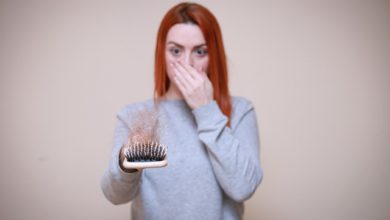Lavender oil for hair: the most important health benefits and methods of application

Lavender oil for hair: the most important health benefits and methods of application
Lavender oil
Lavender oil is an essential oil with an attractive aromatic scent that is extracted from the lavender plant. Lavender oil is characterized by its various health benefits, such as: B- Relieves migraines, moisturizes the skin, purifies the air as well as lavender oil for hair .
Benefits of lavender oil for hair
1. Promote hair growth
A 2016 study in mice found that using lavender oil caused hair to grow faster than usual. It can also help treat pattern baldness. However, more scientific research on humans is needed to prove this.
2. Antimicrobials
One of the benefits of lavender oil for hair is that it has antimicrobial properties, making it a great choice for preventing itchy scalps or treating dandruff or infection.
3. Get rid of head lice
One study found that lavender hair oil and tea tree oil can help prevent and get rid of head lice. Therefore, they can be used together as a complementary treatment to get rid of lice.
4. Reducing skin infections
Lavender oil is used to treat skin infections, sores, minor burns, dry scalp, and insect bites due to its anti-inflammatory properties.
5. Calming effect
Lavender is distinguished by its attractive and calm aroma, which when inhaled calms nerves, relaxes and improves mood.
How to use lavender oil on hair
Lavender oil can be used on the hair in many different ways, depending on your needs and the results you want. Where it can be used by:
1. Massage the scalp with oil
If you want to get the best results from lavender oil for your hair and scalp. The best way to use it is to dilute it with a carrier oil. Examples of carrier oils include:
- Coconut oil: increases the luster and softness of the hair.
- Jojoba Oil: nourishes, moisturizes and stimulates the scalp.
- Almond oil: moisturizes and soothes the scalp.
- Olive oil: helps stop hair loss and stimulates its growth.
It is best to use it after showering. By following these steps:
- Apply the diluted oil to the hair.
- Leave it on for 5 to 10 minutes, then rinse it off.
- For a perfect result, wrap your hair in a towel and leave it overnight.
2. Add lavender oil to your hair care products
Small amounts of lavender oil for hair can be added to your shampoo or conditioner. So only use 2 to 5 drops per ounce of product.
3. Use lavender oil serum
Lavender essential oil serum can be used for hair care or any other serum containing volatile lavender oil. It is used to care for frizzy and oily hair and prevents hair breakage. But it may be less beneficial for hair growth.
4. Use a lavender oil mask on your hair
Like lavender serum, lavender oil mask helps nourish, moisturize and prevent split ends. And to get the best results. Lavender mask can be used weekly.
Other uses for lavender oil
- Massage: It can be used as an essential oil to be applied to different parts of the body such as the shoulders. This is said to help relax and calm the nervous system.
- Reducing cramps: It is best used during the menstrual cycle for women as it can help relieve menstrual cramps.
- Moisturizing the skin: It can be used to treat itchy skin, acne, and moisturize the skin. This is because it has anti-bacterial and anti-inflammatory properties.
- Room fragrance: It can be used as an essential oil at home as it helps to relax, rejuvenate and reduce anxiety.
Precautions used
Using lavender oil on your hair is considered safe, but here are a few things to look for:
- Do not use large amounts of concentrated lavender oil on the scalp as it can irritate the skin. To prevent this from happening, always use it with a different carrier oil, such as coconut oil.
- If there is an infection or rash. Stop using it immediately because it may be a sign that you are allergic to lavender.
- Avoid using the oil near the eyes and rinse immediately with cool water if this happens.
- Avoid inhaling lavender essential oil while taking sedatives or antidepressants. This can make you dizzy and light-headed.
And if you want to get medical advice: Talk to a certified doctor now.
.



